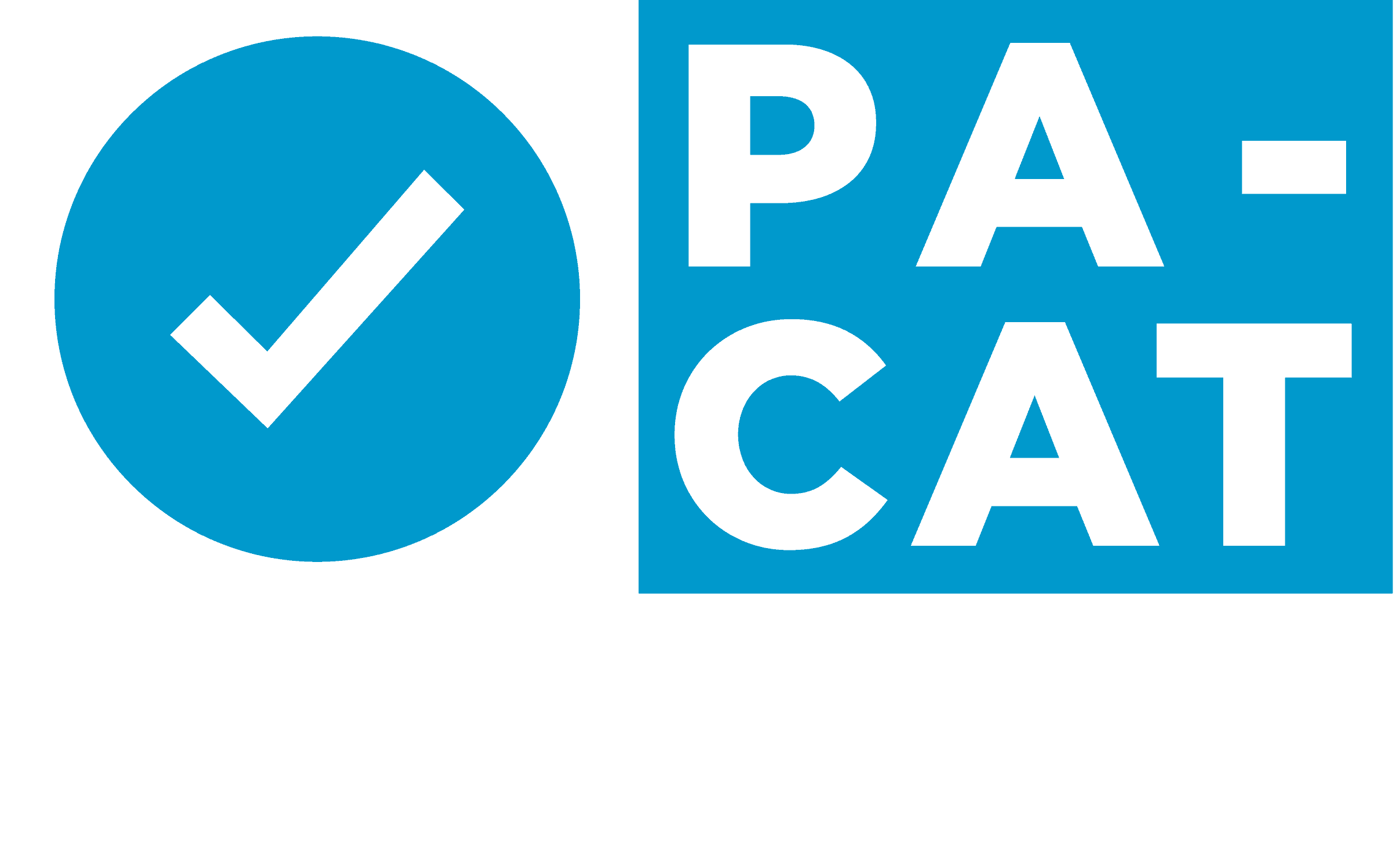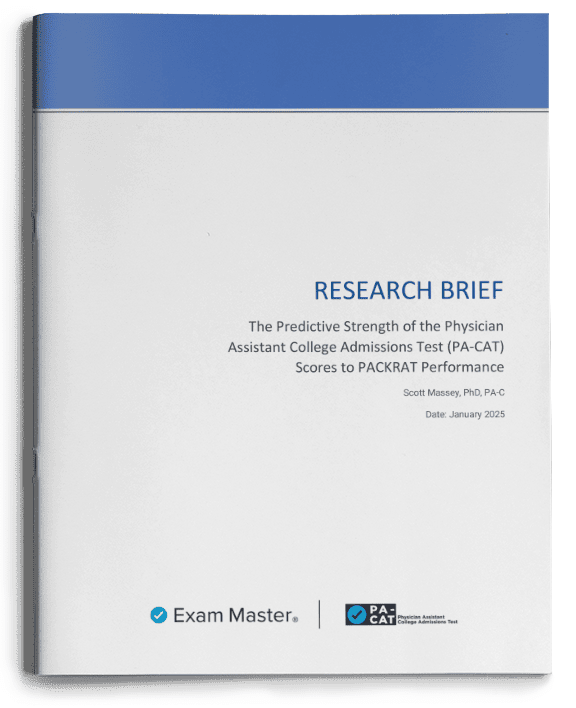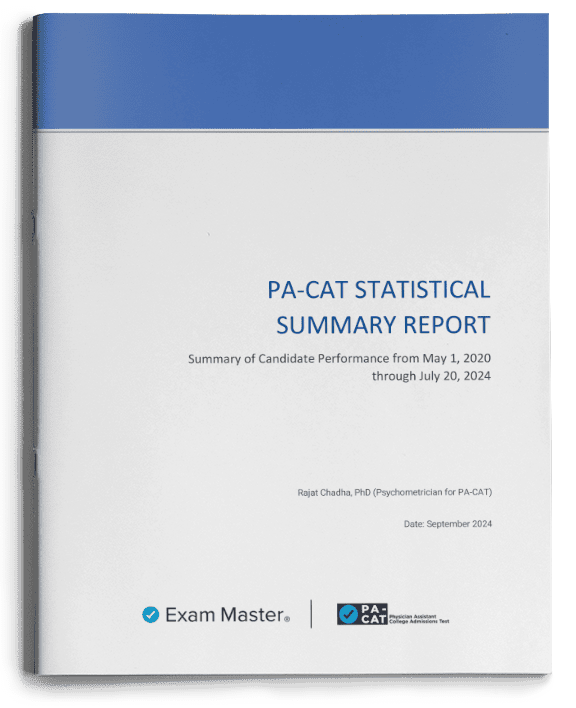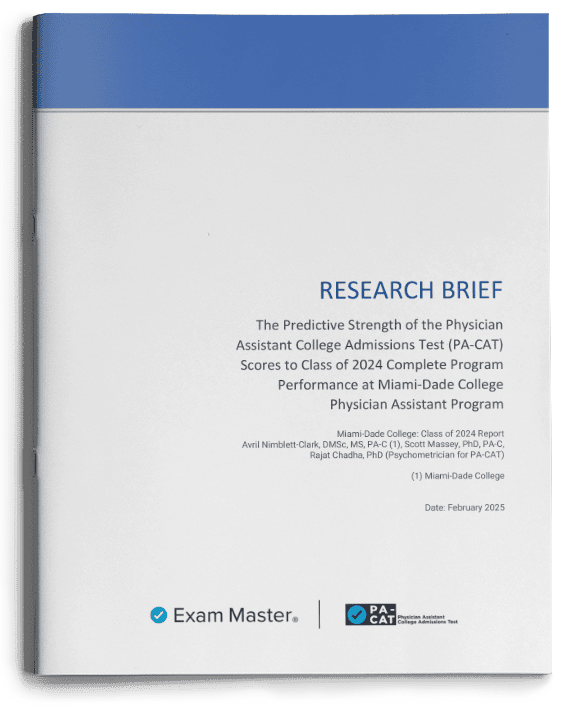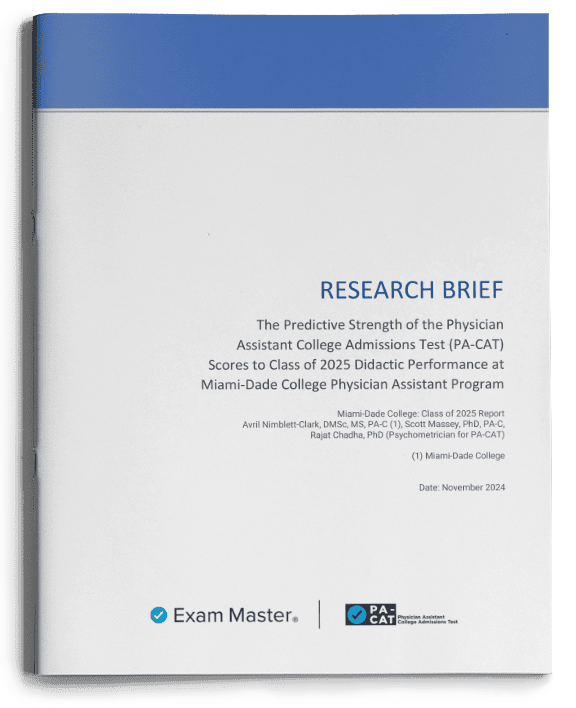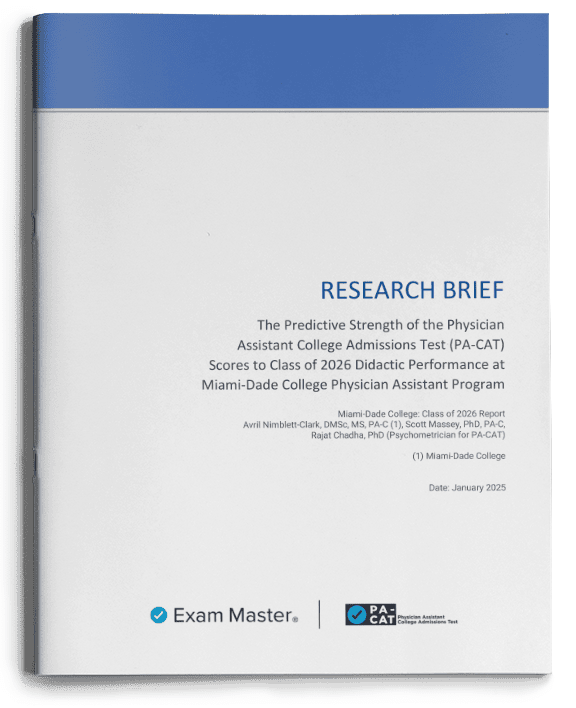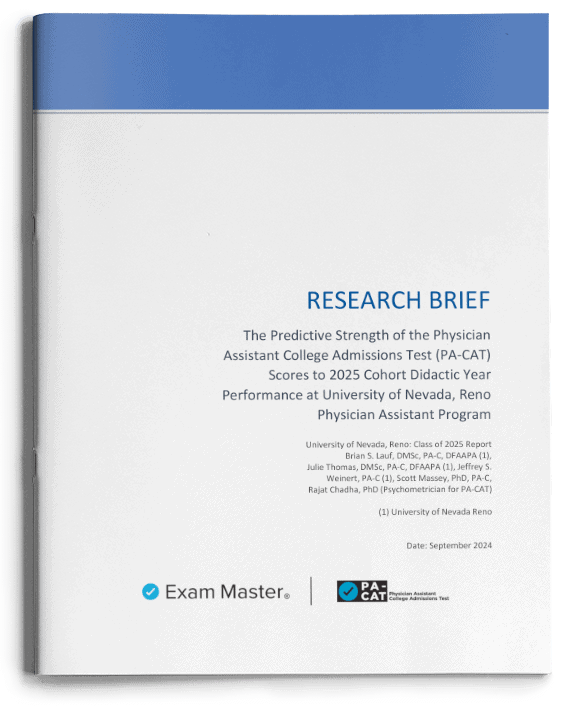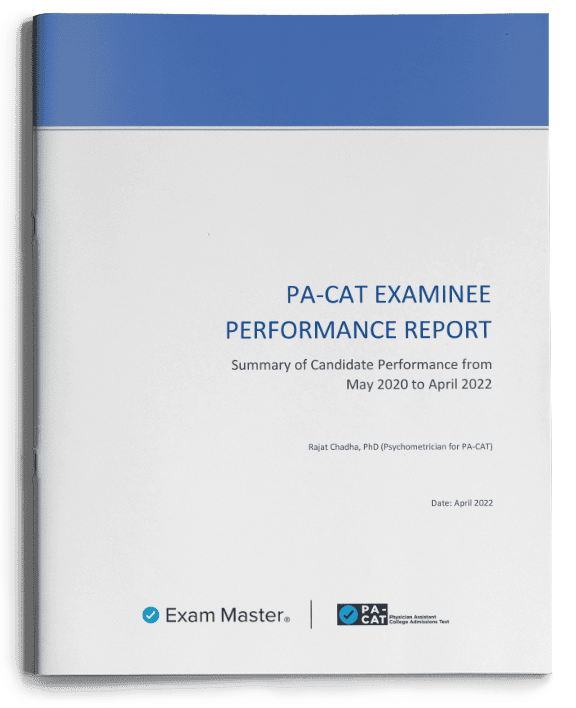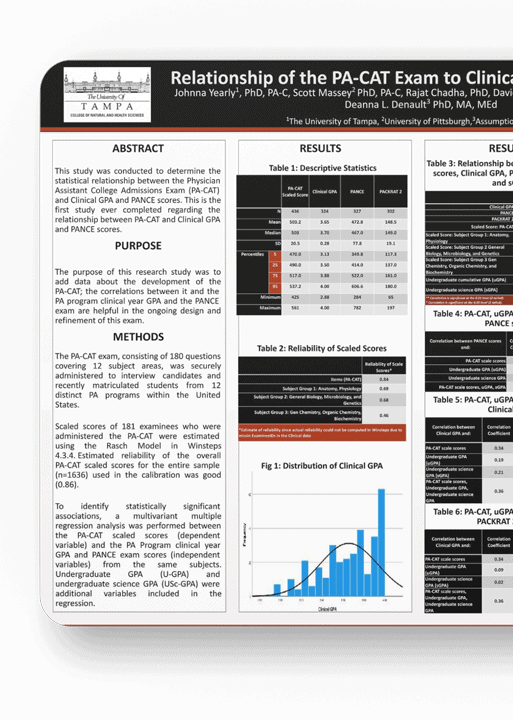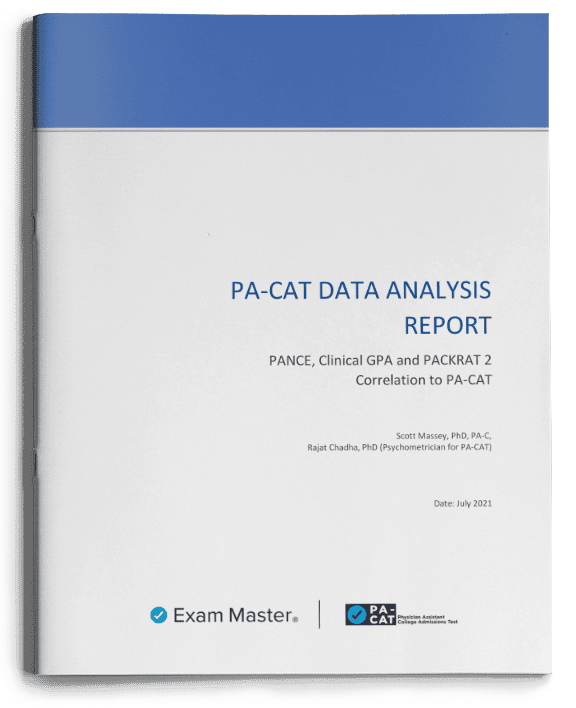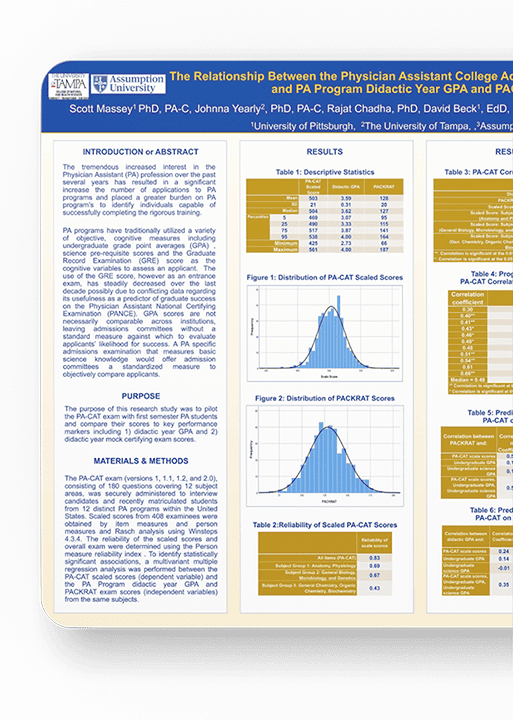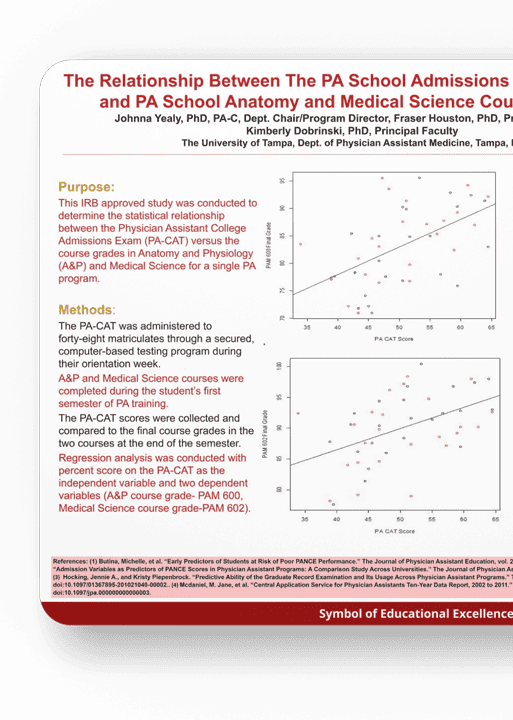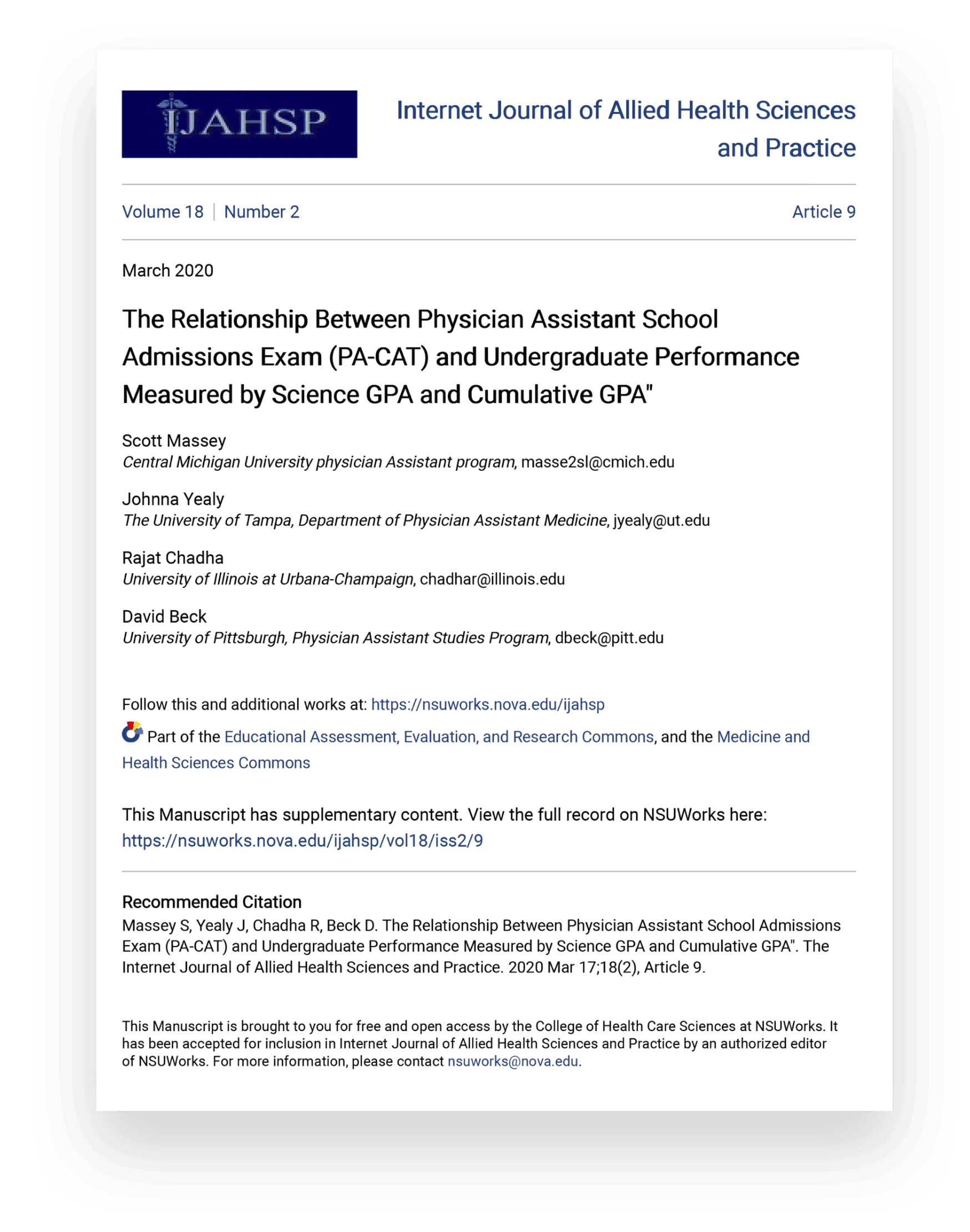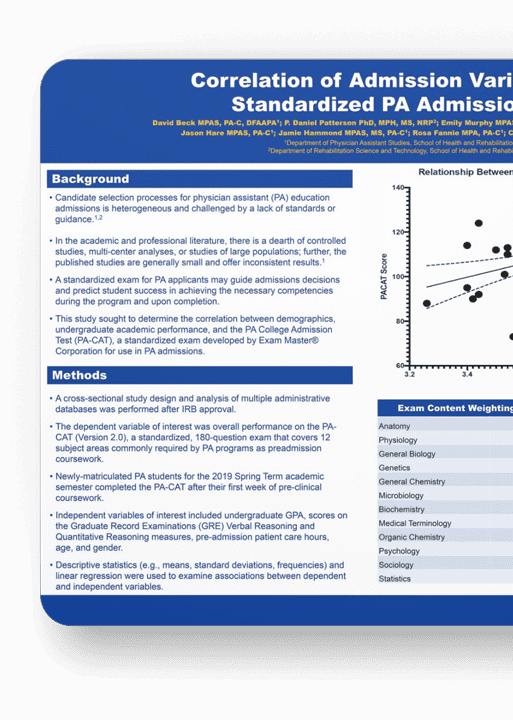PA-CAT Reports & Research Abstracts
Providing PA program directors, admissions directors, and PA faculty with the most current reporting and research information on the PA-CAT.PA-CAT Reports and Research Abstracts
Below are synopsis and briefs from a variety of research conducted for the PA-CAT, including but not limited to:
- PA-CAT Examinee Performance Reports
- PA-CAT Scoring Analysis
- PA-CAT PA Program(s) Analysis
- PA-CAT Correlation to Didactic Courses, Didactic GPA & the PACKRAT
Links are included to all reports.
Scroll down to view the latest research on the PA-CAT.
The principal investigators and psychometrician mentioned below are currently conducting multiple ongoing research studies related to the PA-CAT, to determine the correlation of the PA-CAT as an admissions instrument in relationship to key educational variables within physician assistant education. Significant research emphasis is being placed upon analyzing historical predictors of performance in didactic and clinical education, and PANCE performance as they correlate to the PA-CAT. This includes, but not limited to:
- Individual Didactic Courses (A&P for example)
- First Semester Didactic GPA
- Overall Didactic GPA
- The PACKRAT
- Overall Course GPA
- PANCE scores
Other ongoing research includes PA-CAT Exam Reliability and PA-CAT Scoring Analysis.
PRINCIPAL INVESTIGATOR
Scott Massey, PhD, PA-C
With over three decades of experience in PA education, Dr. Scott Massey is a recognized authority in the field. He has demonstrated his expertise as a program director at the esteemed Central Michigan University and as the research chair in the Department of PA Studies at the University of Pittsburgh.
Dr. Massey’s influence extends beyond practical experience, he has significantly contributed to accreditation, assessment, and student success. His innovative methodologies have guided numerous PA programs to ARC-PA accreditation and have improved program outcomes. His predictive statistical risk modeling has enabled schools to anticipate student results. Dr. Massey has published articles related to predictive modeling and educational outcomes. He has also conducted longitudinal research in stress among graduate Health Science students. His commitment to advancing the PA field is evident through participation in PAEA committees, councils, and educational initiatives.
FORMER PRINCIPAL INVESTIGATOR
Johnna Yearly, PhD, PA-C
Dr. Johnna Yearly, Associate Professor and Program Director at University of Tampa Physician Assistant Medicine Program. Johnna Yealy specializes in emergency medicine. She has also provided clinical services in dermatology, hospital medicine and student health. Dr. Yealy has been actively involved both in state and national professional organizations. She served as the president of the Tennessee Academy of Physician Assistants twice, as well as the vice president and student representative of the Academy. Nationally, she has served in various roles with the Physician Assistant Education Association.
Dr. Yealy has presented at the AAPA, AAMC and PAEA national conferences and authored numerous peer-reviewed journal articles. She has authored a book chapter in dermatology. Yealy was a Statewide Model AHEC Community Advisory Board Member and National Health Service Corps Ambassador. Dr. Yealy serves in the United States Army Reserves in the 7222nd Medical Support Operations Unit and holds the rank of captain. She has been awarded the following: Global War on Terrorism Ribbon, Army Reserve Component Achievement 1st Award, TN Army National Guard Achievement Ribbon (twice).
PSYCHOMETRICIAN
Rajat Chadha, PhD
Dr. Rajat Chadha, with a PhD in Education from Indiana University, Bloomington, is an expert psychometrician with more than 14 years of extensive experience working on multiple significant projects. Dr. Chadha has worked as a psychometrician in high-stakes certification for physicians in the United States. He has also worked on predictive risk modeling for Physician Assistant programs and has published book chapters and peer-reviewed articles in leading journals.
PA-CAT CONTENT MANAGER
Michael Tharp, Exam Master
The PA-CAT research briefs, synopsis and full reports will be updated on an ongoing basis by the principal investigator(s) and psychometrician as a service to the PA educational community to ensure transparency and report the most up-to-date research data and developments.
RESEARCH BRIEF
Show More
These findings reinforce the role of the PA-CAT as an effective predictor of academic success and support its integration into admissions decisions to enhance the selection of qualified PA students. Future research should explore multi-institutional data to further validate these relationships and optimize admissions criteria.
–
Questions about this research? Click Here.
RESEARCH BRIEF
Show More
Additionally, the undergraduate science GPA also showed a significant positive correlation with first-semester GPA, combined cumulative GPA, and the didactic PACKRAT. However, the PA-CAT composite score proved to be a stronger predictor of these outcomes than the undergraduate science GPA alone. Combining the PA-CAT composite score with the undergraduate science GPA provided an even stronger prediction of first-semester GPA, combined cumulative GPA, and the didactic PACKRAT than using the undergraduate science GPA alone.
–
Questions about this research? Click Here.
RESEARCH BRIEF
Show More
These findings show that high PA-CAT exam scores were indicative of better performance in these didactic courses.
–
Questions about this research? Click Here.
RESEARCH BRIEF
Show More
These findings show that the PA-CAT is an excellent tool to identify candidates who are most likely to succeed during the didactic year of the PA program.
–
Questions about this research? Click Here.
RESEARCH BRIEF
Show More
These findings underscore the potential of PA-CAT exam scores as a useful tool within PA programs’ admissions process.
–
Questions about this research? Click Here.
REPORT
Show More
The PA-CAT is a 240-item specialized discipline-specific assessment that is designed to measure knowledge and application in nine prerequisite science subjects necessary for success in the demanding Physician Assistant (PA) curriculum. The PA-CAT has been developed specifically for use by PA educators and their admissions departments as part of a holistic admissions process.
–
Questions about this research? Click Here.
RESEARCH BRIEF
Show More
Results indicated that PA-CAT scores are useful in predicting performance in didactic courses in the first semester of the PA program, the overall first semester PA program GPA, and the number of C grades or below.
–
Questions about this research? Click Here.
REPORT
Show More
Includes sub-scores for Biology, Chemistry, and Anatomy and Physiology domains. Shows quintile rankings for all scoring domains. Statistical analysis of scores including standard deviation, skewness, and kurtosis.
Includes latest content and weighting details by subject. Includes sample score report.
–
Questions about this research? Click Here.
RESEARCH ABSTRACT
Show More
Researchers found that there was a moderately statistically significant positive relationship between the PA-CAT and both the PA program clinical year GPA and PANCE scores. These early results suggest that the PA-CAT scaled score and comparison percentile could provide a stronger understanding of a PA candidate’s basic science knowledge than using the candidate’s cumulative GPA, science GPA or their GRE score.
–
Questions about this research? Click Here.
RESEARCH REPORT
Show More
PA-CAT scaled scores have a medium or close to medium statistically significant (p<0.01) positive correlation with clinical GPA (r=0.29), PANCE scores (r=0.38), and PACKRAT 2 scores (r=0.30).
PA-CAT scaled scores explain about 8.3% of the variance in clinical GPA. Undergraduate GPA and undergraduate science GPA do not add much value to the prediction of clinical GPA beyond PA-CAT scaled scores. The three predictor variables together explain about 9.0% of the variance in Clinical GPA.
PA-CAT scaled scores explain about 14.8% of the variance in PANCE scores. Undergraduate GPA and undergraduate science GPA add some value to the prediction of PANCE scores beyond PA-CAT scaled scores. The three predictor variables together explain about 21.8% of the variance in PANCE scores.
PA-CAT scaled scores explain about 9.0% of the variance in PACKRAT 2 scores. Undergraduate GPA and undergraduate science GPA do not add much value to the prediction of clinical GPA beyond PA-CAT scaled scores. The three predictor variables together explain about 11.7% of the variance in PACKRAT 2 scores.
This research study demonstrates the potential value of PA-CAT scores in predicting PA program’s clinical performance, PANCE scores, and PACKRAT 2 scores. The study will be updated when additional data becomes available in the future.
–
Questions about this research? Click Here.
RESEARCH ABSTRACT
Show More
The tremendous increased interest in the Physician Assistant (PA) profession over the past several years has resulted in a significant increase the number of applications to PA programs and placed a greater burden on PA programs to identify individuals capable of successfully completing the rigorous training. PA programs have traditionally utilized a variety of objective, cognitive measures including undergraduate grade point averages (GPA), science pre-requisite scores, and the Graduate Record Examination (GRE) score as the cognitive variables to assess an applicant. The use of the GRE score, however as an entrance exam, has steadily decreased over the last decade due to conflicting data regarding its usefulness as a predictor of graduate success on the Physician Assistant National Certifying Examination (PANCE). GPA scores are not necessarily comparable across institutions, leaving admissions committees without a standard measure against which to evaluate applicants’ likelihood for success. A PA-specific admissions examination that measures basic science knowledge would offer admission committees a standardized measure to objectively compare applicants.
–
Questions about this research? Click Here.
RESEARCH ABSTRACT
Show More
The researchers ran a regression analysis on the PA-CAT percent score (independent variable) on the A&P course grade and medical science course grade (dependent variables). Both courses showed a moderate positive correlation with PA-CAT scale scores, which A&P being slightly higher.
These early results show that PA-CAT test scores may be useful in identifying students who may struggle in the basic science courses (A&P and Medical Sciences) and who may benefit from a study program prior to starting the PA program.
–
Questions about this research? Click Here.
RESEARCH ABSTRACT
Show More
FORMAL ABSTRACT
Physician Assistant (PA) programs often set minimum GPA and graduate record examination (GRE) requirements for admission, citing that candidate with higher admission scores will perform better in the PA program. However, to date, there are limited published studies with inconsistent results that have investigated the validity of using these preadmission characteristics to predict performance in PA programs or on the Physician Assistant National Certifying Exam (PANCE). The development of a physician assistant college admission test (PA-CAT) that has predictive validity to determine PANCE success would give PA admissions committees an additional resource to make decisions. This study was conducted to determine the strength of the relationship between PA-CAT and undergraduate cumulative and science GPA.
Methods: The PA-CAT is comprised of 180 questions covering twelve subject areas based on research identifying the relative importance of that subject to success in the PA curriculum. The exam was administered through a secured computer-based testing to 479 newly admitted PA students across the United States. Regression analysis was conducted with Rasch scale scores as the dependent variable and two independent variables (undergraduate GPA and undergraduate science GPA).
Results: The PA-CAT Rasch scale scores are positively correlated with undergraduate GPA (r=0.16) and undergraduate science GPA (r=0.22). Although these correlation coefficients are statistically significant (Conclusion: Early results from this research study demonstrates there is a statistically significant relationship between the PA-CAT and undergraduate science GPA in newly admitted PA students.
Limitations of the study include the fact that students voluntarily took this exam without consequence. Further study is needed to determine if the exam can be generalized to the entire PA applicant pool thereby providing a valid instrument for admissions decisions.
–
Questions about this research? Click Here.
RESEARCH ABSTRACT
Show More
FORMAL ABSTRACT/BACKGROUND
Candidate selection processes for physician assistant (PA) education admissions is heterogeneous and challenged by a lack of standards or guidance. (1,2)
In the academic and professional literature, there is a dearth of controlled studies, multi-center analyses, or studies of large populations; further, the published studies are small and offer inconsistent results. (1)
A standardized exam for PA applicants may guide admissions decisions and predict student success in achieving the necessary competencies during the program and upon completion.
This study sought to determine the correlation between demographics, undergraduate academic performance, and the PA College Admission Test (PA-CAT), a standardized exam developed by Exam Master® Corporation for use in PA admissions.
- Moore S, Clark C, Haught A, et al. Factors associated with academic performance in physician assistant graduate programs and national certification examination scores: a literature review. Health Professions Education. 2018. doi: 10.1016/j.hpe.2018.06.003
2. Honda T, Patel-Junankar D, Baginski R, Scott R. Admissions variables: predictors of physician assistant student success. J Physician Assist Educ. 2018;29(3):167-172. doi:10.1097/JPA.0000000000000212
–
Questions about this research? Click Here.

Exam Master Corporation
200 Continental Drive
Suite 401
Newark, DE 19713
USA
Visit our site for Educators:
Exam Master, Inc.
